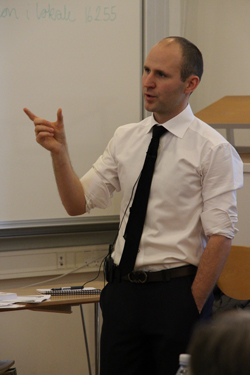PhD defence: Consensus or coercion - Collective bargaining coordination and third party intervention
 The dissertation consists of five papers which aim to understand the relationships between institutions, processes and outcomes of coordinated collective bargaining between organisations for workers and employers. Especially, the dissertation investigates the role of third party intervention for collective bargaining. The papers have partly overlapping hypotheses, levels of analysis, data and research designs. Together they explore and explain how configurations of institutions are created and sustained over time and how they influence bargaining processes and outcomes.
The dissertation consists of five papers which aim to understand the relationships between institutions, processes and outcomes of coordinated collective bargaining between organisations for workers and employers. Especially, the dissertation investigates the role of third party intervention for collective bargaining. The papers have partly overlapping hypotheses, levels of analysis, data and research designs. Together they explore and explain how configurations of institutions are created and sustained over time and how they influence bargaining processes and outcomes.
On one hand, collective bargaining puts a floor under terms and conditions of employment and collective bargaining is therefore rightly regarded as a centrepiece of the European Social Model. Through collective representation and bargaining, workers are arguably better protected from some of the social risks that labour markets entail. On the other hand, collective bargaining can be beneficial for employers. Internationalisation of economies has increased the need for coordination across industries due to macro-economic concerns for price stability and employment. Integration of product markets means that costlevels within a country must not exceed the competitors in other countries. This gives impetus for actors to moderate wages across industries using collective agreement as a ceiling for labour costs. As such, coordinated collective bargaining holds the dual-promise of reducing social risks for workers and containing costs for employers.
If collective bargaining as a regulatory process hinges upon the ability of parties to reach agreements, institutions that facilitate this should be pivotal. All over the Western world, institutions for conciliation, mediation or arbitration by third parties exist to help unions and employers settle in bargaining. These institutions have, however, often been neglected in studies of how collective bargaining is evolving and sustained. To remedy this omission, the dissertation explores the conditions for and the role of third party intervention into collective bargaining.
Christian Lyhne Ibsen defended his PhD dissertation on Friday the 8th of November at the University of Copenhagen. The members of the assessment committee was: Associate Professor Peter Abrahamson, Department of Sociology, University of Copenhagen (chairman), Professor Anders Kjellberg, Lund University, Sweden, and Professor Claudius Wagemann, Goethe University, Frankfurt am Main, Germany.
 The dissertation generally supports the view that collective bargaining as a regulatory process can achieve positive results for both employers and employees. However, it also identifies the demanding institutional preconditions needed to sustain collective bargaining under volatile markets and technological change. Furthermore, the dissertation stresses that collective bargaining institutionalises power-relations among actors and that the specific details of institutions will have distributive consequences. Ultimately, the continued support for bargaining by strategic actors resides in how well conflicts between these actors are resolved. The dissertation shows that mediation institutions can play an important role herein – and that they certainly have done so in Sweden and Denmark.
The dissertation generally supports the view that collective bargaining as a regulatory process can achieve positive results for both employers and employees. However, it also identifies the demanding institutional preconditions needed to sustain collective bargaining under volatile markets and technological change. Furthermore, the dissertation stresses that collective bargaining institutionalises power-relations among actors and that the specific details of institutions will have distributive consequences. Ultimately, the continued support for bargaining by strategic actors resides in how well conflicts between these actors are resolved. The dissertation shows that mediation institutions can play an important role herein – and that they certainly have done so in Sweden and Denmark.
Around 50 guests took part in Christian Lyhne Ibsen's PhD defence and the following reception.
Read more about the dissertation
Contact:
Christian Lyhne Ibsen, e-mail: cli@faos.dk, phone: +45 35 32 39 04
Academic Books
 The PhD dissertation can be bought at Academic Books, Øster Farimagsgade 5, 1353 Copenhagen K.
The PhD dissertation can be bought at Academic Books, Øster Farimagsgade 5, 1353 Copenhagen K.
